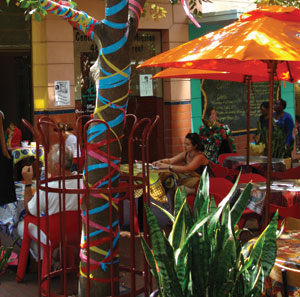 South Africa is a country of amazing contrasts, from the tall, grand peaks of the Drakensburg Mountains to crystalline beaches where whales and dolphins swim within easy view of the shore. Johannesburg has malls as upscale and contemporary as any in America, while not far away squatters live on miles of dirt fields filled with four-foot high shacks, built from random pieces of aluminum siding, with no water, electricity, or plumbing.
South Africa is a country of amazing contrasts, from the tall, grand peaks of the Drakensburg Mountains to crystalline beaches where whales and dolphins swim within easy view of the shore. Johannesburg has malls as upscale and contemporary as any in America, while not far away squatters live on miles of dirt fields filled with four-foot high shacks, built from random pieces of aluminum siding, with no water, electricity, or plumbing.
The first time I visited there in 1996, I was acquainted with only one flutist, Mikki Steyn, who I had met through the internet. South Africans had such difficulty sending money out of the country, even via credit cards, that she asked me to bring her a copy of Trevor Wye’s editions of the Mozart G and D Flute Concerti, which were not available in South Africa for purchase. She drove the hour from her home in Pretoria to where I was staying in Johannesburg to pick them up from me. It wasn’t until my third visit to this country this past March that I began to get a sense of the flute community of South Africa.
In addition to western music education, South Africa has an abundance of ethnic African music, which includes African flutes, jazz, folk, and indigenous music. Besides English and Africaans (derived from the Dutch settlers), this amazing country has nine other official languages, such as Zulu, Xhosa, and Ndbele, and the sounds on the city streets and the countrysides are endlessly fascinating and beautiful.
Flutists in South Africa
.jpg) Bridget Rennie-Salonen is the Flute-Lecturer at the University of Cape Town, South African College of Music, and a freelance performer and soloist. She is the former solo principal of the Cape Town Philharmonic Orchestra. Regarded as one of South Africas’s finest flutists, she has performed as soloist with the Cape Philharmonic, Cape Town Symphony, and Cape Town Philharmonic Orchestras, the Camerata Tinta Barocca, the Stellenbosch Camerata, Cape Town Baroque Ensemble, and the Eastern Cape Philharmonic. She leads the Cavatina Quartet (flute and strings) and performs regularly in Zomari, a duo with guitarist James Grace. She performs extensively as a chamber musician and orchestral principal flutist as well as a soloist, and is frequently invited to adjudicate examinations.
Bridget Rennie-Salonen is the Flute-Lecturer at the University of Cape Town, South African College of Music, and a freelance performer and soloist. She is the former solo principal of the Cape Town Philharmonic Orchestra. Regarded as one of South Africas’s finest flutists, she has performed as soloist with the Cape Philharmonic, Cape Town Symphony, and Cape Town Philharmonic Orchestras, the Camerata Tinta Barocca, the Stellenbosch Camerata, Cape Town Baroque Ensemble, and the Eastern Cape Philharmonic. She leads the Cavatina Quartet (flute and strings) and performs regularly in Zomari, a duo with guitarist James Grace. She performs extensively as a chamber musician and orchestral principal flutist as well as a soloist, and is frequently invited to adjudicate examinations.
Jason King is an Englishman who married a South African woman and moved to Cape Town in 2005. With a background in business, he saw how difficult it was for South African flutists to obtain advanced flute music, and established the only flute specialist shop in the country. The Flute Specialists (www.flutesyou.co.za) stocks many major brands of flutes. King has also become a major influence in pulling together and stimulating the flute community with events and clinics. “I see the potential here,” he says. “I want to build a stronger network among the flutists, and get more people interested in the flute.” He has sponsored events with flutists Tessa Brinkman, Bridget Rennie-Salonen, Eva Tammasy, Raffaele Trevisani, and Helen Spielman, and is planning one with Swedish flutist Anders Ljungar-Chapelon in 2009.
Helen Vosloo is the principal of the Johannesburg Philharmonic Orchestra and a freelance performer. She is the recipient of several of South Africa’s top music awards. South African composer Hendrik Hofmeyr dedicated his flute concerto to her. She performs with the Wessel van Tensburg Jazz Piano Trio and Trio Hemanay, with whom she has toured the U.S. and Europe. William Bennett and Peter Lukas Graf are among her teachers.
Gabriele von Durckheim is principal of the Cape Town Philharmonic Orchestra. Her teachers include Bridget Rennie-Salonen and Trevor Wye. She was a member of the Malaysian Philharmonic Orchestra.
Liezl Stolz is a flute lecturer at the University of Cape Town South African College of Music and a freelance performer. She studied with Shigenori Kudo and Peter Lukas Graf, as well as taking masterclasses with Jean-Pierre Rampal, Jean Ferrandis, Maxence Larrieux, Trevor Wye, Pierre-Yves Artaud, and William Bennett. She has won prizes in several international competitions and performs extensively as a soloist, with a classical guitar duo, and as a member of Trio du Cap (flute, cello, piano).
Corvin Matei is a conductor, flutist, and flute lecturer at Stellenbosch University. Born in Romania, he served as principal flute of the Cape Town Symphony Orchestra for 12 years. He is music director of the Cape Sinfonia, and maintains a busy conducting career in South Africa and internationally.






